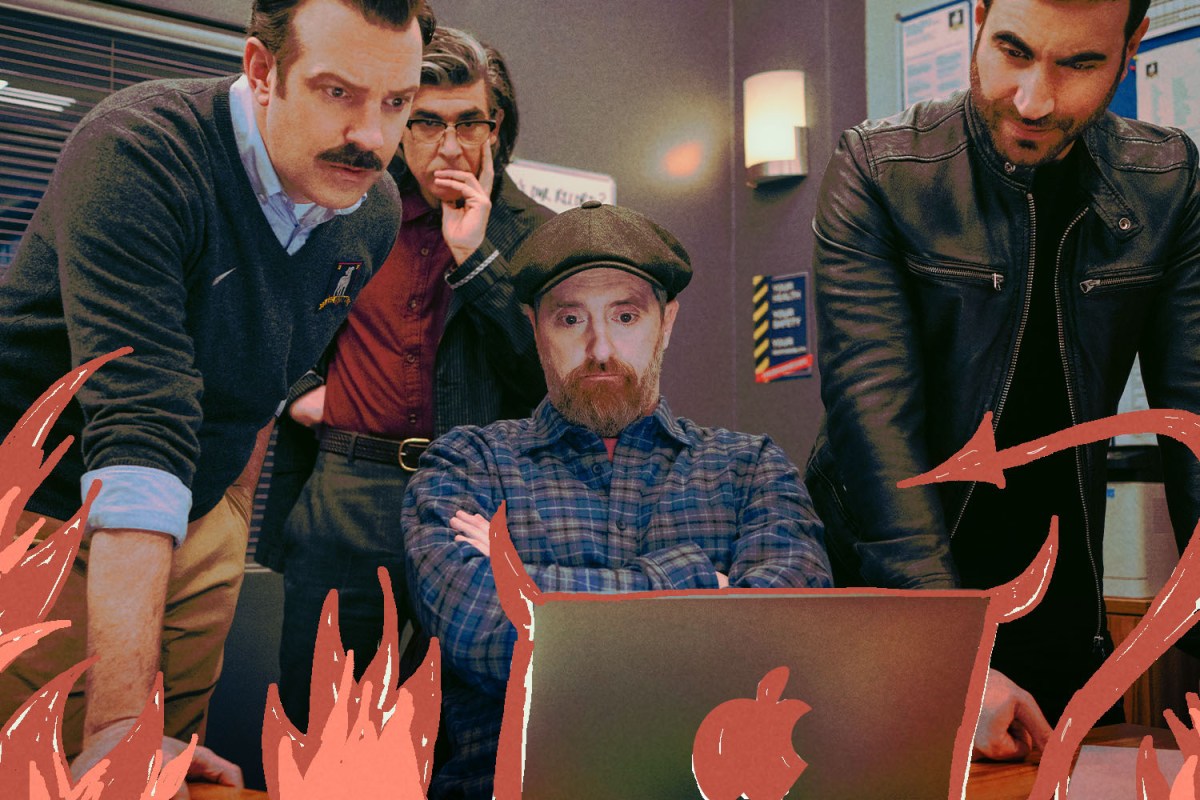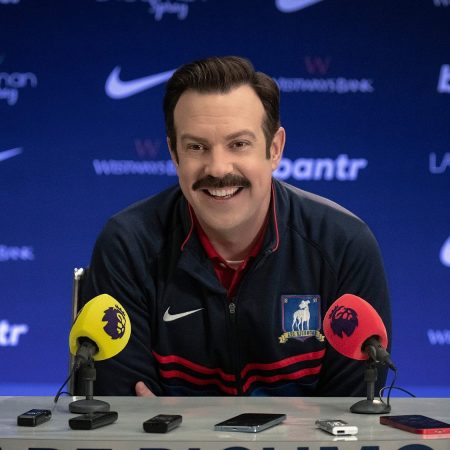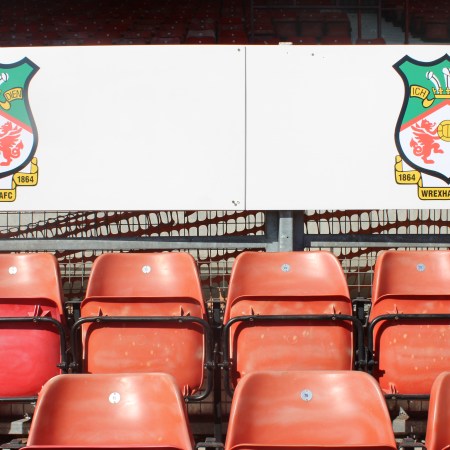Over a typical day at Ted Lasso’s Nelson Road, your coworkers may alternatively: deliver you a pink box of sugar cookies, cheer your name as you enter a room, offer cogent relationship advice (assuming you can tolerate a few howls), or gently help you excise decades-old demons. If a writer’s room could convince a generation to pine for cubicles in Scranton, it’s little wonder that this iteration of London — Sesame Street with pints — is a daydream workplace for so many online.
There’s even comfort to be found in the show’s lowest moments. In the final episode of the first season, after the Greyhounds lose a heartbreaker to Manchester City, securing their relegation, Ted says to a woeful locker room of players, ownership and stadium staff:
“This is a sad moment right here. For all of us. Ain’t nothing I can say standing in front of you right now that can take that away. But please, do me this favor, will ya? Lift your heads up and look around this locker room. Look at everybody else in here. I want you to be grateful that you’re going through this sad moment with all these other folks. Because I promise you. There is something worse out there than being sad. And that is being alone and being sad. Ain’t nobody in this room is alone.”
If you’re looking for a spiritual thesis at the core of this show, it isn’t one of Ted’s puns. It isn’t even the iconic “Believe” poster. It’s that mini-monologue above: whatever happens, people are at their best when surrounded (and supported) by other people. It’s a powerful message, and a particularly resonant one in the middle of an ascendant loneliness crisis. You can see why Apple is so proud of its surprise hit, which is now a third of the way through its third and final season.
There’s another, recurring visual in Ted Lasso, though, that’s hard to imagine the multi-trillion-dollar tech behemoth vibing with — the look that typically hopeful characters assume when they’re crunched over their Apple products, looking their most miserable, lost and lonely.
Can Ted Lasso Save EA Sports?
Better graphics is nice. But playing as AFC Richmond is a revelation.The 🍎 is everywhere
Consider: no one owns an iPhone case in Ted Lasso. There’s a reason. In the A.F.C. Richmond universe, all texts are blue, personal tech is never on silent, and another glittering Apple logo is always just a scene or two away. A fair share of the show’s plotting — from player announcements to PR crises — hinges on a character pulling a dinging product (ever the latest, teenaged version) from their pocket. Whoever else is in the room will either wait for them to finish reading the message, Love Island-style, or crowd around the small screen for a framing shot.
Is Ted Lasso operating under some sort of “Apple minimum”? Probably? Who knows? (Other shows, like Shrinking, also appear to make extensive use of the parent company’s products.) This construction is largely fine, and if you don’t let it bother you, it isn’t too distracting. We’re used to the omnipresence of smart technology in our own lives, and besides, so much of the day-to-day at A.F.C. Richmond appears so delightful.
But as the show’s gotten steadily darker over the last three seasons, its 15 various writers haven’t shied away from this technology’s Charybdian pull — the devastating role that iPhones and iPads can play when characters are sad and alone.
This latest season, fittingly, appears to be about Ted. Can Coach Lasso afford himself the same patience and love that he reserves for every other lost soul in his orbit? His face was the very first shot of the season. In Lasso tradition, it will almost certainly be the last. (Rebecca and Nate took seasons one and two, respectively.)
Ted’s a mess
So far, this season finds Ted at a rock bottom, and the Apple products are not alright — Ted’s phone is more or less synonymous with a late-night glass of Scotch at this point, as he pores over old messages and new photos concerning his old marriage counselor…who is now dating his ex-wife.
If Apple Inc. offers Ted Lasso any saving grace, it might be the once-in-a-while chance to see his son. But these FaceTimes are almost always cut short (his son is usually running to school, or karate, or the other room), and tend to zap Ted of whatever energy he has left, reminding him how far away he is from home and questioning why he ever left in the first place. This makes his job as manager extremely difficult. Ted doesn’t know the X’s and O’s, but in the past, he’s been able to compensate by believing in the people and the cause. If he’s too dazed to motivate, though, what’s he really good for? Rebecca is left apoplectic. She needs to beat Rupert; where is that Ted magic?!
It’s a mess. And it’s one that’s been there for seasons now, only last season Ted started seeing Dr. Sharon Fieldstone, with whom he made some major breakthroughs. Unfortunately, she’s just an avatar on an Apple product now. (Not to decry telehealth therapy as inadequate; but in the show, Ted seems unfulfilled, even morose, when their sessions are cut short and the screen turns to black. It’s important to him to have a positive, in-person relationship with everyone in his life, even the man who flips him the bird in the park each morning.)
Darth Nate
Does anyone have a positive, private relationship with their phone? No. Not on this show. Nate’s descent to the dark side is fueled by endless scrolls through social media, the “wonder kid” either beaming with pride or fuming with anger as he reads his phone in an office after-hours. He’s obviously still furious with his loveless grouch of a father (and rightfully so, to an extent), but when’s the last time we saw him visit his parents’ house? When’s the last time he had a single real conversation with anyone?
Before A.F.C. Richmond’s dramatic early-season bout with West Ham United, Nate confided in Rupert — of all people — that he was nervous to see Ted again. Nate’s smart enough to know that the version he’s created of Ted, the one that he can piece together by digesting mean tweets and ignoring well-meaning texts, is not the man who looked after him…the very first A.F.C. Richmond manager who even bothered to learn his name. He has a couple chances to speak to Ted face to face, to set things right. But he’s a little out of practice.
Sometimes, the show’s Apple products are for jokes (Coach Beard sending crazy texts), for intrigue (Rebecca unknowingly courting Sam) or to round out B-plots (characters messaging each other nice things after learning something over the course of the episode). But these moments aren’t memorable or convincing enough to overshadow the moments that Ted or Nate are in an emotional spiral, or Rebecca suffers a drive-by FaceTime from her erratic mother, or Roy or Keeley are sad-scrolling through any sort of content related to their currently-extinguished relationship.
Digital isolation
To be clear: this reality is a credit to the courageous writers of this show. Within the context of an admittedly fantastical narrative, they’ve created a time capsule of social isolation in the digital age. The show tornado-chases themes of anxiety, depression, grief and loss, and along the way, whether consciously or not, arraigns the tools that too often exacerbate those issues.
Is this nuance lost on Apple? Has the company unwittingly devoted millions to a series that undermines its lifestyle pitch? That’s a bit of a stretch — at the end of the day, Lasso’s characters are using Apple products. And we like Lasso’s characters. Even Nate, sort of. The arc of the show, meanwhile (which has been compared to the original Star Wars trilogy) will likely end with a rousing Marcus Mumford riff and a degree of triumph, either on the pitch or in the emotional accounting of our core cast. People will look back on Ted Lasso, an Apple show, and think good things. They’ll watch it again, years from now, when they need a jolt of humor and heart.
If you read between the lines, though, or just pay attention anytime there are a lot of bodies on the screen, you’ll notice that in the show’s most enduring moments, there isn’t an iPhone, iPad or MacBook Pro with Liquid Retina XDR display in sight. These people forget their problems, figure them out, or find a way to laugh about them, if even for a moment, when they’re together.
This article was featured in the InsideHook newsletter. Sign up now.
























